

Panorama Project. How to read a book in 5 minutes (AKA how to figure out if this book will appeal to your reader) November 13, 2018 If you’re like me, the thought of doing readers’ advisory for someone whose reading tastes are very different from yours can be nerve-wracking.
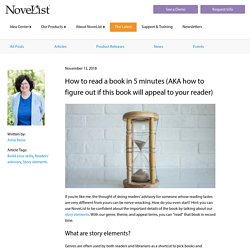
How do you even start? Hint: you can use NoveList to be confident about the important details of the book by talking about our story elements. With our genre, theme, and appeal terms, you can “read” that book in record time. What are story elements? Genres are often used by both readers and librarians as a shortcut to pick books and describe a particular reading experience. Appeal is the “feel” of a book, and a way of determining why people enjoy the books they read. Themes, the newest addition to NoveList, use language that a reading community uses. How can you use them to “read” a book? Let’s say that a patron has heard about The Death of Mrs. Mrs. The character appeals, flawed and sympathetic, tell you that the characters are imperfect, but you may find yourself rooting for them anyway.
And … congratulations! Now you try. Reading for Fun on Campus. According to the 2015 Pew Research study on reading habits, 80 percent of young adults — those aged 18 to 29 — had read a book in the past 12 months, more than any other age group.
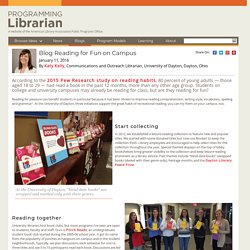
Students on college and university campuses may already be reading for class, but are they reading for fun? Reading for pleasure can benefit students in particular because it has been shown to improve reading comprehension, writing style, vocabulary, spelling and grammar¹. At the University of Dayton, three initiatives support the great habit of recreational reading; you can try them on your campus, too. At the University of Dayton, "blind-date books" are wrapped and marked only with their genres. Start collecting In 2012, we established a leisure-reading collection to feature new and popular titles. The Porch Reads book club gets students reading for pleasure while enjoying other benefits, like free food and a chance to win bookstore credit.
Google Sheets vous permet de créer et de modifier des feuilles de calcul en ligne gratuitement. Tout Google avec un seul compte Connectez-vous pour accéder à Google Sheets.
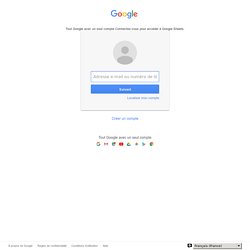
Localiser mon compte Mot de passe oublié ? Se connecter avec un autre compte Créer un compte Tout Google avec un seul compte. Dear Banned Author: Your Story Made a Difference. Imagine receiving a letter from someone who admires your work — a brief but powerful acknowledgement that your actions made an impact.
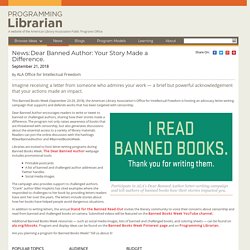
This Banned Books Week (September 23-29, 2018), the American Library Association's Office for Intellectual Freedom is hosting an advocacy letter-writing campaign that supports and defends works that has been targeted with censorship. Participate in ALA's Dear Banned Author letter-writing campaign and tell authors of banned books how their stories impacted you. Dear Banned Author encourages readers to write or tweet to banned or challenged authors, sharing how their stories made a difference. The program not only raises awareness of books that are threatened with censorship, but also generates discussions about the essential access to a variety of library materials. Readers can join the online discussion with the hashtags #DearBannedAuthor and #BannedBooksWeek.
Dear Banned Author Letter-Writing Campaign. About l Get Involved l Postcards l Author Mailing Addresses l DBA Drawing & Prize Tips for Hosting a Program l Tips for Tweeting l Promotional Tools for Libraries About Dear Banned Author is a letter-writing campaign hosted by the American Library Association’s Office for Intellectual Freedom.
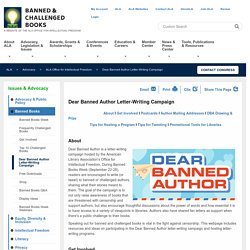
During Banned Books Week (September 22-28), readers are encouraged to write (or tweet) to banned or challenged authors, sharing what their stories meant to them. The goal of the campaign is to not only raise awareness of books that are threatened with censorship and support authors, but also encourage thoughtful discussions about the power of words and how essential it is to have access to a variety of viewpoints in libraries. Speaking out for banned and challenged books is vital in the fight against censorship. Get Involved.
Dear Banned Author Letter-Writing Campaign.